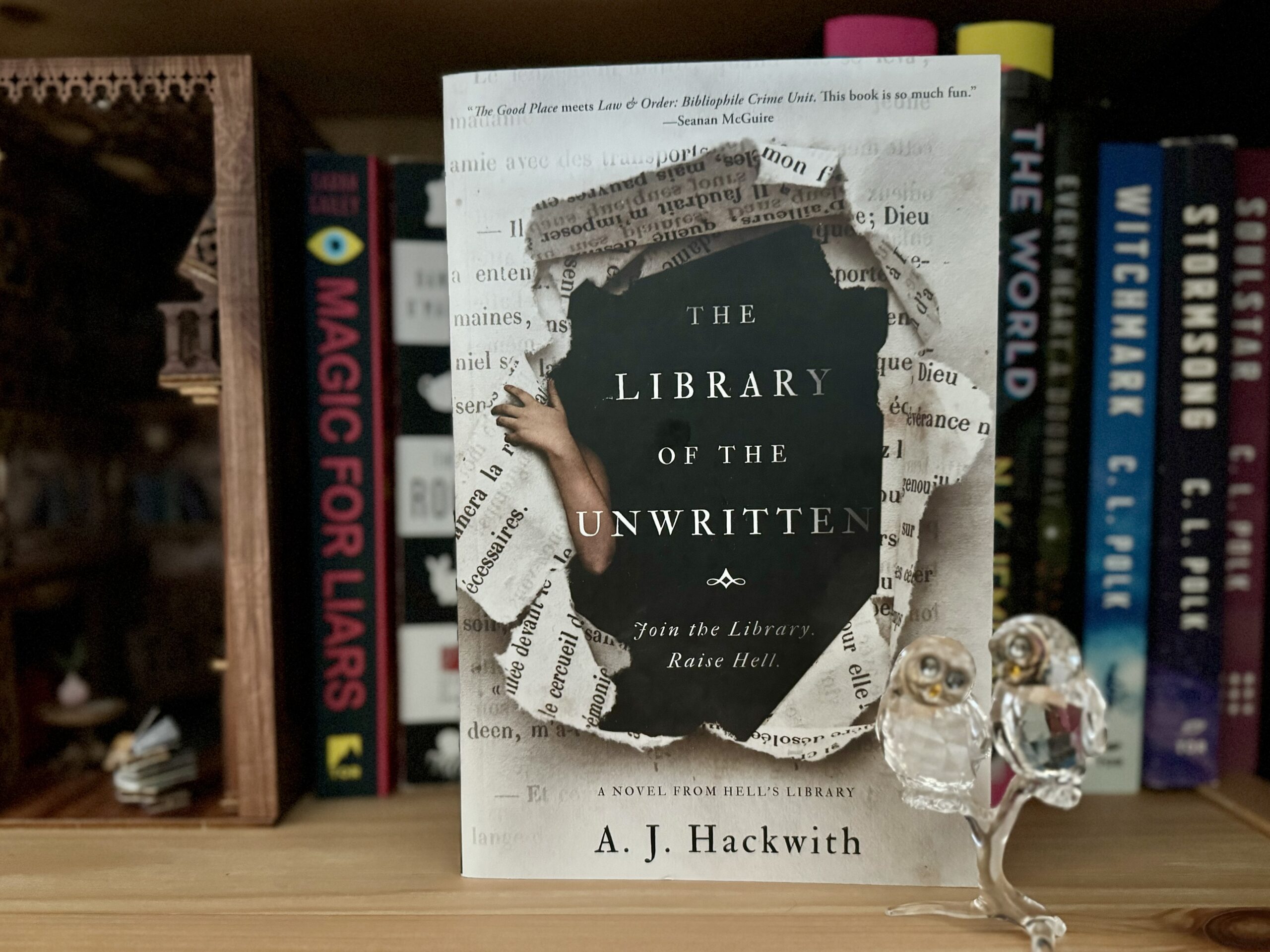The Library of Hell. A mysterious and powerful book. At least three librarians characters. A book combining mystery, action, and fantasy – sounds like a recipe for literary fun, right?
That’s what I was hoping for when I picked up A. J. Hackwith’s The Library of the Unwritten. Specifically, I wanted a new series that would fill the hole in my heart for books about book-lovers. In my experience, fantasy stories about book-lovers tend to assume that they need to grow and expand more for true fulfillment. Here, I was hoping that an after-death librarian would be a little more self-actualized.
Instead, The Library of the Unwritten is an engaging, fun, action-adventure with supposedly bookish characters and an interesting (if confusing) take on the afterlife. It gets a lot right, just ith an unintended set of implications about the importance of reading.
Librarians, out of Hell
Let’s start with the premise. Claire is the head of the Library of the Unwritten, a wing of the Library of Hell that contains all unwritten works. Her duties are a little unclear, but they include maintaining her physical copies of books and keeping the books from escaping to meet their owners. She also spends a reasonable amount of brain-space on how to keep the library independent from its hellish hosts, who wants access to the power of the unrealized read. The story kicks off when one of those books escapes to Seattle. In the process of hunting it down, she encounters a fallen Angel / Watcher who’s looking for another, more powerful book – one that could precipitate a war on Earth.
The adventure that follows is a whirlwind of settings, mythologies, and intrigue. In short order, Claire visits multiple afterlives, including Valhalla and an Egyptian-inspired wasteland. Up on “the surface”, she also spends time in Malta. And of course there are scenes in both Heaven and Hell. Hackwith does a great job bringing this world to life, particularly the multitude of afterlives. (Some elements remain confusing to me – how do the Angels have such a sense of superiority when faced with evidence of other, popular afterlives?) The world feels real, and lived-in, particularly from Claire’s offhand references to other afterlives.
Each setting comes with its own set of adventures. The characters experience everything from fantastical foes, trial by combat, thrilling chases, and quote-offs. There’s a dash of magic, a ton of action, and an expansive set of character revelations. It’s an entertaining fantasy/adventure story with interesting (if perhaps under-developed) characters. So what’s my problem?
Where are the books?
Despite ostensibly being librarians, none of the characters really spend that much time with, around, or loving books. Claire spends a few pages of the story on book repair, but the majority of the story follows her around our world and the next. There’s little time to see why or how she loves books or stories. Instead, the text paints her as a badass with a little bit of book-related skin.
In theory, the protagonists’ goal is to find the Devil’s Bible, a book that could start a war between Heaven and Hell. That’s… bookish, right? And it could be a reasonable starting point, if their follow-up activities had anything to do with books. There’s a brief section in the story where Claire has a “story battle” involving identifying quotes with another Librarian; and of course, she spends the story accompanied by a character from an unwritten book. But the story battle gets truncated, and the character is basically just another person – it’s not clear what truly differentiates him from a human/demon/angel. In short, this is a story about characters who supposedly love books, who go on an adventure in which they use or reference almost none.
The net result is a story that implies loving books is not enough. Claire and her crew are galvanized by a book, sure – but none of their actions rely on their knowledge of books or reading. We may be told the characters love books, but we don’t see it happening.
Reading is a verb, not an aesthetic
The frequency of reading as an aesthetic on my social media feeds has been a more recent source of frustration. I understand the temptation to romanticize reading, and I love having beautiful shelves. But it’s not having the perfect reading nook or the most colorful shelves that makes me a “reader”. Instead, it’s simply the fact that I read. Simply acquiring books or physically being around them does not achieve that objective.
So, too, for the librarians in this book. It’s not enough to tell me they work around books or that they bind them; I want to see how they use books, how their reading changes them. I want to see them have favorite characters and Strong Opinions about their reading materials. The most bookish characters draw inspiration from their reading; it supports them and extends them, rather than acting as set-dressing.
An interesting contrast here is Good Omens, which contains zero librarians but plenty of bookish characters. Aziraphale is both a book dragon and a reader: we see him actually reference his reading materials as he and Crowley save the world. The same can be said for Anathema Device, who frequently references her ancestor’s writing; and The Them, who read about the world constantly. These are reading characters, whose rating has an impact on the story – and they don’t need a title to prove it.
If The Library of the Unwritten were marketed as simply a fantasy adventure about librarians in the afterlife, that would be fine by me. It’s a fun read, just not a “bookish” one – and it’s the bait-and-switch that gets me every time.
This will count for my 52 Book Club Challenge – as a book set in a city starting with the letter “M”.
Until next time – stay cozy, and stay curious!
